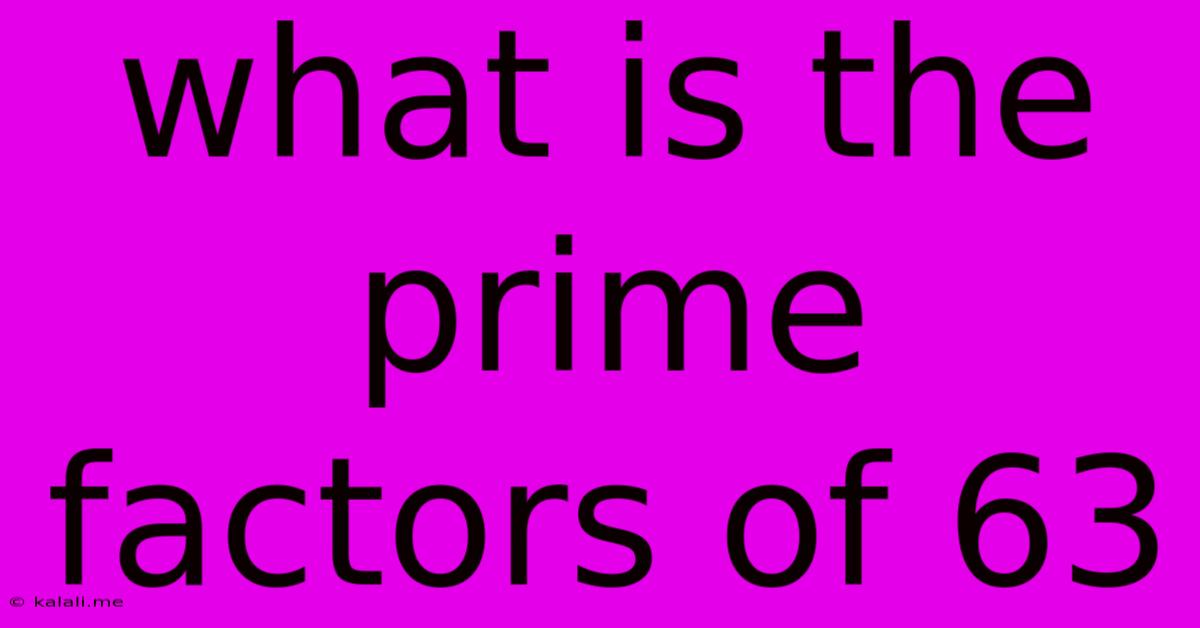What Is The Prime Factors Of 63
Kalali
Jun 12, 2025 · 2 min read

Table of Contents
What are the Prime Factors of 63? A Step-by-Step Guide
Finding the prime factors of a number is a fundamental concept in mathematics, particularly useful in number theory and algebra. This article will guide you through a simple method to determine the prime factors of 63, explaining the process in an easy-to-understand way. Understanding prime factorization can improve your skills in simplifying fractions, finding the greatest common divisor (GCD), and least common multiple (LCM), among other applications.
What are Prime Factors?
Before diving into the calculation, let's define key terms. A prime number is a whole number greater than 1 that has only two divisors: 1 and itself. Examples include 2, 3, 5, 7, 11, and so on. Prime factorization is the process of expressing a number as a product of its prime factors. Every composite number (a number with more than two divisors) can be uniquely expressed as a product of prime numbers.
Finding the Prime Factors of 63
There are several ways to find the prime factors of 63. The most common method is using a factor tree.
-
Start with the smallest prime number: The smallest prime number is 2. However, 63 is not divisible by 2 (it's an odd number). The next prime number is 3. Is 63 divisible by 3? Yes! 63 divided by 3 is 21.
-
Continue the process: Now, we work with the quotient, 21. 21 is also divisible by 3. 21 divided by 3 is 7.
-
Identify the prime factors: We've reached 7, which is a prime number. This means we've reached the end of our factorization.
Therefore, the prime factorization of 63 is 3 x 3 x 7, or 3² x 7. These are the prime factors of 63.
Representing Prime Factorization
The prime factorization of 63 can be represented in a few ways:
- Factor tree: A visual representation showing the branching of factors.
- Exponential notation: Using exponents to show repeated factors (3² x 7).
- List: Simply listing the prime factors (3, 3, 7).
Applications of Prime Factorization
Understanding prime factorization is crucial for various mathematical operations:
- Simplifying fractions: Finding the greatest common divisor (GCD) of the numerator and denominator allows for simplification.
- Finding the least common multiple (LCM): Essential for adding and subtracting fractions with unlike denominators.
- Solving algebraic equations: Prime factorization can be used in solving certain types of equations.
This step-by-step guide illustrates how to easily find the prime factors of 63. Remember, mastering this skill is essential for developing a solid foundation in mathematics and for tackling more advanced mathematical concepts.
Latest Posts
Latest Posts
-
What Are The Factors Of 97
Jun 13, 2025
-
Which Of The Following Is A False Statement
Jun 13, 2025
-
Is Ifsc Code And Swift Code Same
Jun 13, 2025
-
Which Test Is Not A Projective Test
Jun 13, 2025
-
Which Of The Following Is An Open Ended Question
Jun 13, 2025
Related Post
Thank you for visiting our website which covers about What Is The Prime Factors Of 63 . We hope the information provided has been useful to you. Feel free to contact us if you have any questions or need further assistance. See you next time and don't miss to bookmark.